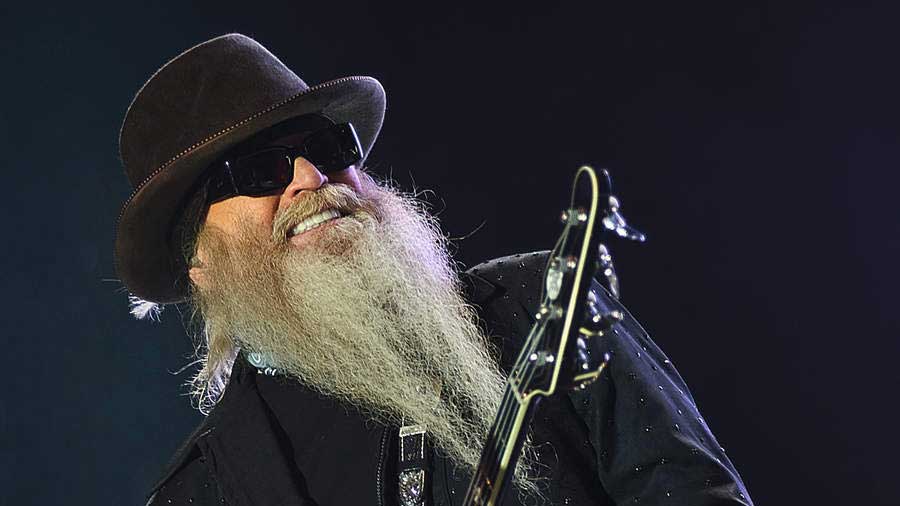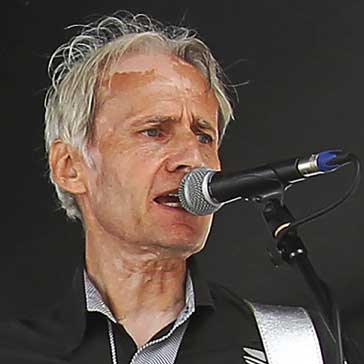The sudden death in July 2021 of ZZ Top bass player, singer, songwriter and keyboard player Dusty Hill was especially devastating given the man’s robust, yet understated, presence on the rock star A-list over such a long period of time.
With his long, flowing beard, black shades and inevitable cowboy hats, Hill and his mirror-image bandmate, guitarist Billy Gibbons, along with drummer Frank Beard, created a sound, an image and a mythology that defined ZZ Top, the self-described little ol’ band from Texas, and turned them into one of the wonders of the rock’n’roll world.
Like the heads carved out of stone on Mount Rushmore, these larger-than-life Methuselahs seemed destined to last forever. Indeed the band were touring right up to the day Hill died in his sleep at home in Houston, having gone to the city to seek treatment for an injury to his hip, with the band’s guitar tech Elwood Francis taking his place on stage. Almost immediately, Gibbons stated the band’s intentions to play out the remaining shows on the tour.
ZZ Top played their first concert without Hill on July 30, just three days after his death. During a show in Tuscaloosa, Alabama, Gibbons introduced Francis as “my friend, your pal”, before adding that Hill had given his consent for the group to continue without him.
“Got a new guy up here, as you know. Dusty gave me the directive,” Gibbons announced. A few days earlier, he had informed Variety of Hill’s wish that: “The show must go on."

From humble beginnings in 1969 in Houston, ZZ Top initially toured their way to greatness in America and, by the time they mounted their Worldwide Texas Tour of 1976, had become one of the biggest stadium acts in the land.
The trio’s ambition continued to grow, along with their beards, and with the release of their eighth album, Eliminator, in 1983 they became global stars of the MTV era. With the help of a string of strikingly memorable promo videos accompanying the hits Gimme All Your Lovin’, Sharp Dressed Man and Legs, ZZ Top sealed a unique and indelible image in the popular imagination and earned themselves a rare diamond certification for sales in excess of 10 million copies of Eliminator in the USA alone.
In 2004 the band were inducted into the Rock And Roll Hall Of Fame by Keith Richards at a ceremony which they closed with a rousing rendition of Tush (their first US Top 20 single, released in 1975) sung with a typically boisterous swagger by Hill. While their commercial fortunes and recorded output declined somewhat in the new millennium, ZZ Top never stopped touring.
“We’ll talk about splitting headaches and splitting hairs, but not splitting up,” Gibbons declared.
Joseph Michael Hill was born in Dallas, Texas in 1949. His mother, a gifted singer, worked as a waitress, and one of Dusty’s earliest musical memories was of her bringing home a copy of an Elvis Presley record from the jukebox in the diner where she worked, which he sang along to. When he was eight, Dusty was given a guitar for Christmas, but it was his elder brother, Rocky, who learned to play it. When the two of them began playing in bands together, Rocky made it clear to him that Dusty’s role would be as the bass player.
In 1964 the teenaged brothers were gigging together in a band called Lady Wilde And The Warlocks, featuring a female singer from Liverpool. On the circuit they met a drummer called Frank Beard, who they quickly brought into he band, after which they recorded three locally released singles. Rocky, Dusty and Frank then formed a new band called the American Blues, who released a self-titled debut album in 1968.
When Rocky left the line-up, Frank and Dusty were on the lookout for a singer/ guitarist at the same time that Gibbons was looking for a new rhythm section for his fledgling project, a Houston-based trio called ZZ Top. The first time the three of them got together, Dusty suggested they play a shuffle in C. According to Gibbons, the song lasted for three uninterrupted hours.
“We will forever be connected to that blues shuffle in C,” he said, more than 50 years later, on hearing the news of his bandmate’s death.
The incredible musical chemistry that the three musicians had discovered on their first meeting together was no small thing. All three were steeped in the blues. They knew the discipline and the conventions of that most traditional of popular music forms. But they were open to experimentation and extending the boundaries of how far that music could travel. With his big, powerful hands and fingers, Hill developed a bass playing style that was thick and full, holding down the bottom end of ZZ Top with a repertoire of free-flowing boogie rhythms and sturdy, heavy-rock riffs.
From the chunky, martial stomp of Waitin’ For The Bus to the speedy stride of Thunderbird and the frantic bass-bomb finale of I’m Bad, I’m Nationwide, Hill had it all covered. Plus he was a great singer, whose high, raucous shout contrasted perfectly with Gibbons’s low, bluesman’s drawl.
On songs like Beer Drinkers And Hell Raisers the pair would trade alternate vocal lines, or they would harmonise like blues brothers as on their epic version of Sam & Dave’s soul song I Thank You.
Hill was, of course, one third of the incredibly prolific songwriting partnership that the band maintained from the outset. And later when ZZ Top entered their era of mainstream chart success in the 1980s, it was Hill who added distinctive keyboard parts to hits such as Velcro Fly and TV Dinners, a role that he carried through into their stage performances.
On stage, while Beard performed at the back with apparently stoic indifference, Hill and Gibbons fronted the band with a glorious, synchronised choreography that at times verged on the surreal. The routines they developed over years of roadwork – sloping round the stage in shadow formation, whipping the necks of their guitars back together in perfect time, the comical ‘crossed-knee’ manoeuvre in the middle of Sharp Dressed Man – made their live show a visual delight as much as a musical tour de force, and ultimately led to their unlikely success as a video act.
Hill was certainly key to all that. The early years of ZZ Top was one long treadmill of playing second-string gigs in second-string towns all across Texas. In a town called Alvin, they played an entire show, including encore, to an audience of just one man.
Their manager, Bill Ham, was an old-school Houston impresario whose faith in the band was matched by a steely determination not to cut corners in developing either their craft or their career. He kept them working on the road incessantly, convinced that this was the surest method of honing their licks and building a lifelong audience. “He gave me direction, not only as part of the band, but as a person,” Hill later said of Ham, who died in 2016. “He was a very wise man. And I loved him.”
The band’s appropriately titled debut, ZZ Top’s First Album, was released in 1970, but it was not until their third album, Tres Hombres, in 1973, that they truly blossomed. That album was a work of outstanding genius. It became their first million seller and set the standard for everything that followed. It included their first hit – and still the band’s signature song – La Grange, a high-tensile boogie about the notorious Chicken Farm brothel, later to become the subject of the film The Best Little Whorehouse In Texas (1982) starring Dolly Parton.
The embodiment of Texan folklore in their music and outlook was a key part of the ZZ Top narrative, and Hill’s enduring allegiance to the Lone Star State was almost as consuming as his commitment to the band.
When I first met him, backstage at a gig in Hanley in the north of England in 1983, he was agreeable company with a cheerful roughness of manner. But his mood darkened when the discussion turned to the band’s decision to remain based in Texas rather than relocate to one of the traditional show business meccas of Los Angeles or New York. He reserved particular scorn for Texan-born stars such as Johnny Winter and Janis Joplin who had moved away at the earliest opportunity.
“People told us we had to move,” he said. “Fuck ’em. It’s not necessary.”
Hill was a rock of stability in ZZ Top, providing a centre of gravity for the band both musically and emotionally. He said little in public about the inner workings of the group, and even less about himself.
“There have been any number of low points in my life, but I never discuss them in public,” he said. “They’re not for others to pick over and dissect. All I will say is that you have to have the right attitude to these downturns. You have to go through the low points to appreciate the highs in life.”
When the band went on hiatus for three years from the start of 1977 after the Worldwide Texas Tour, Gibbons went gallivanting around Europe and India, while Beard went on a heroin and cocaine bender that ended in a stretch in rehab. Hill, by contrast, took a job, incognito, as a baggage handler at the Dallas/Fort Worth International Airport.
“For me, success is a great thing,” he said. “It can also really screw with you. You don’t know if people around you treat you well or badly according to who they think you are or who you really are. I just wanted to feel normal. So I got me a job at the airport.
"I got me a work shirt that said ‘Joe’ on it, cut my hair and I worked there for a couple of months. I was really happy. Friday night, I’d go to the beer joint and dance and drink and flirt with the girls. And everybody knew me as Joe. It gave me a sense of being grounded, I guess.”
Hill’s wild days of beer drinking and hell-raising never quite deserted him. In December 1984 he was admitted to Memorial City Medical Center in Houston with a bullet lodged in his abdomen. He was accompanied by “a woman” who told police that she was helping Hill take off his boots at home when a .38-calibre Derringer fell from one of them and went off. Hill was unsure at first whether the bullet had hit him. But he was persuaded to go to hospital, where a “standard” operation to remove the bullet was completed successfully.
In 2000 a ZZ Top tour was cancelled when Hill contracted hepatitis C. After he had recovered and the band resumed touring, he declared that he was “living proof that hepatitis C can be contained and ZZ Top cannot”.
Sadly, no one can beat the odds for ever. Asked a few years ago what he would like to have written on his tombstone, Hill said he was unable to come up with a suitable answer.
Maybe a line from ZZ’s Jesus Just Left Chicago would fit the bill: 'You don’t have to worry… cos Taking Care Of Business is his name.'
Dusty Hill's final album with ZZ Top, Raw, is out now. In the new issue of Classic Rock, we interview Billy Gibbons about life after Dusty Hill and the future of ZZ Top. It's available to buy online.

